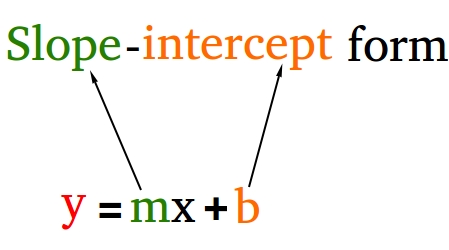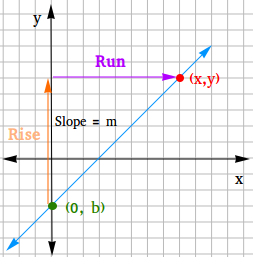Slope Intercept Form
Linear Equation Builder - Slope-Intercept Form
Learn how to write equations in slope-intercept form: y = mx + b
where m is the slope and b is the y-intercept
Case 1: Slope and Y-intercept
Enter the slope (m) and y-intercept (b):
Practice Session - Case 1
Practice writing equations in slope-intercept form given the slope and y-intercept.
Write the equation in slope-intercept form with:
Slope (m) =
Y-intercept (b) =
Enter your answer in the form: y = mx + b
y = xCase 2: Slope and Point
Practice Session - Case 2 (Slope and Point)
Practice writing equations in slope-intercept form given a slope and a point.
Given:
Slope (m) =
Point: (, )
Case 3: Two Points
Enter two points:
Practice Session - Case 3 (Two Points)
Practice writing equations in slope-intercept form given two points.
Given the points:
Point 1: (, )
Point 2: (, )
The slope intercept form of a linear equation is y = mx + b, where m is the slope and b is the y-intercept. The graph of a linear equation is a line and y = mx + b is one of the most common forms to write the equation of a line.

How to Derive the Slope Intercept Form of a Linear Equation
Consider an arbitrary point (x,y) on the line and a point (0,b) on the y-axis. Then, you can use the slope formula to derive the slope-intercept form.

Slope = Rise / Run = (y1 - y2) / (x1 - x2)
Using (x1,y1) = (x,y) and (x2,y2) = (0,b), compute the slope m.
m = (y - b) / (x - 0)
m = (y - b) / x
Multiply both sides of the equation by x
(x)m = y - b
mx = y - b
Add b to both sides of the equation
mx + b = y - b + b
y = mx + b
Slope Intercept Formula
The slope intercept formula is the equation y = mx + b
m is the slope of the line
b is the y-intercept or the point on the y-axis
x and y are the x and y coordinates
Examples Showing how to Find the Slope-Intercept Form of a Straight Line
The goal of these exercises is to write the equation of a straight line in slope-intercept form (y = mx + b) by considering the following cases:
- The slope and the y-intercept are given (example #1)
- The slope and a point on the line are given (example #2)
- Two points on the line are given (example #3)
Example #1
If the slope of a line is m = 2 and the y-intercept is b = 5, write the slope intercept form of the line.
The equation is y = 2x + 5.
Example #2
If the slope of a line is m = 5 and (1, 6) is a point on the line, find the slope intercept form of the line.
This time we have m, but b is missing, so we have to find b.
Since m = 5, y = mx + b becomes y = 5x + b.
Now, use (1, 6) to get b.
Since x = 1 and y = 6, you can replace them into the equation.
Substituting 1 for x and 6 for y gives 6 = 5×1 + b.
6 = 5×1 + b is just a linear equation that you can solve to get b.
6 = 5×1 + b
6 = 5 + b
Subtract 5 from both sides.
6 − 5 = 5 − 5 + b
1 = 0 + b
1 = b
Now since we have b, y = 5x + 1
Example #3
Suppose (2, 3) and (4, 9) are two points on a line. Find the slope intercept form of the line.
This time both m and b are missing, so the first thing to do is to get m and then use m and a point, either (2, 3) or (4, 9) to get b.
Let x1 = 4, y1 = 9 and x2 = 2, y2 = 3
m = (y1 − y2) / (x1 − x2) = (9 − 3) / (4 − 2 ) = 6 / 2 = 3
Now we can use the value for m and one point to get b as already done in example #2.
Although you have two points, It does not matter which point you choose. Since both points are on the line, they will yield similar results.
Choosing (2, 3), x = 2 and y = 3
Substituting 2 for x, 3 for y, and 3 for m into the equation y = mx + b we get:
3 = 3 × 2 + b
3 = 6 + b
Subtract 6 from both sides
3 − 6 = 6 − 6 + b
-3 = 0 + b
-3 = b
Now we have b = -3 and m = 3, y = 3x + -3
Slope Intercept Form Special Cases
The y-intercept b is equal to zero
In this case, y = mx and the line always goes through the origin of the coordinate system.
The slope of the line is equal to zero
In this case, y = (0)x + b = b and when you graph the line, it will be a horizontal line as it crosses the y-intercept.
The slope of the line is undefined
In this case, x is equal to the x-coordinate of any point on the line or any other number that is given to you in an exercise. When you graph the line, it will be a vertical line as it crosses the x-intercept.
Notice that you cannot find the equation in slope intercept form when the slope is undefined since you cannot find a value for the slope or m.
For example, if the line has an undefined slope and passes through the points (-2, 1) and (-2, 5), the equation of the line is just x = -2